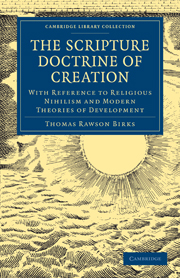 The Scripture Doctrine of Creation
The Scripture Doctrine of Creation Book contents
- Frontmatter
- Contents
- INTRODUCTION
- CHAPTER I ON RELIGIOUS NIHILISM
- CHAPTER II ON RELIGIOUS NIHILISM (continued)
- CHAPTER III THE ALLEGED LAW OF SCIENTIFIC PROGRESS
- CHAPTER IV THE BEGINNING
- CHAPTER V THE CREATION OF MATTER
- CHAPTER VI ON INFINITE SPACE
- CHAPTER VII ON FORCE, LAW, AND NECESSITY
- CHAPTER VIII ON CREATION AND LIFE
- CHAPTER IX ON CREATION AND EVOLUTION
- CHAPTER X EVOLUTION AS AN INDUCTIVE THEORY
- CHAPTER XI ON CREATION BY LAW
- CONCLUSION
CHAPTER II - ON RELIGIOUS NIHILISM (continued)
Published online by Cambridge University Press: 29 August 2010
- Frontmatter
- Contents
- INTRODUCTION
- CHAPTER I ON RELIGIOUS NIHILISM
- CHAPTER II ON RELIGIOUS NIHILISM (continued)
- CHAPTER III THE ALLEGED LAW OF SCIENTIFIC PROGRESS
- CHAPTER IV THE BEGINNING
- CHAPTER V THE CREATION OF MATTER
- CHAPTER VI ON INFINITE SPACE
- CHAPTER VII ON FORCE, LAW, AND NECESSITY
- CHAPTER VIII ON CREATION AND LIFE
- CHAPTER IX ON CREATION AND EVOLUTION
- CHAPTER X EVOLUTION AS AN INDUCTIVE THEORY
- CHAPTER XI ON CREATION BY LAW
- CONCLUSION
Summary
The doctrine that any true knowledge of God is impossible from the very laws and limits of human thought, is one main feature of “the Philosophy of the Unconditioned.” But this dogma is further developed by writers of the positive school from their own point of view. In the First Principles of Mr. Spencer, and its chapter on Ultimate Religious Ideas, this principle of absolute religious Pyrrhonism or Nihilism is laid down with much deliberation, as the basis of a new system of scientific philosophy. Six pages contain the supposed disproof of the main foundation of Christianity, and indeed of all religious faith. But while four of these are a quotation, pressed into the service of a cause exactly opposite to the intention of its writer, the original part in this refutation of Theism reduces itself to two pages alone. The huge pyramid of unbelief rests on an apex so narrow as to be little more than a mathematical point. But remarks on which so vast a structure of unbelief is reared need to be examined on that ground alone.
Atheism, Pantheism, and Theism, it is first assumed, are three rival theories, of which the common claim is to solve the great problem of the universe. “The question, what is it, and whence does it come, suggests itself to every mind. Three answers, verbally intelligible, may be made, that it is self-existent, self-created, or created by external agency.
- Type
- Chapter
- Information
- The Scripture Doctrine of CreationWith Reference to Religious Nihilism and Modern Theories of Development, pp. 35 - 49Publisher: Cambridge University PressPrint publication year: 2009First published in: 1872


